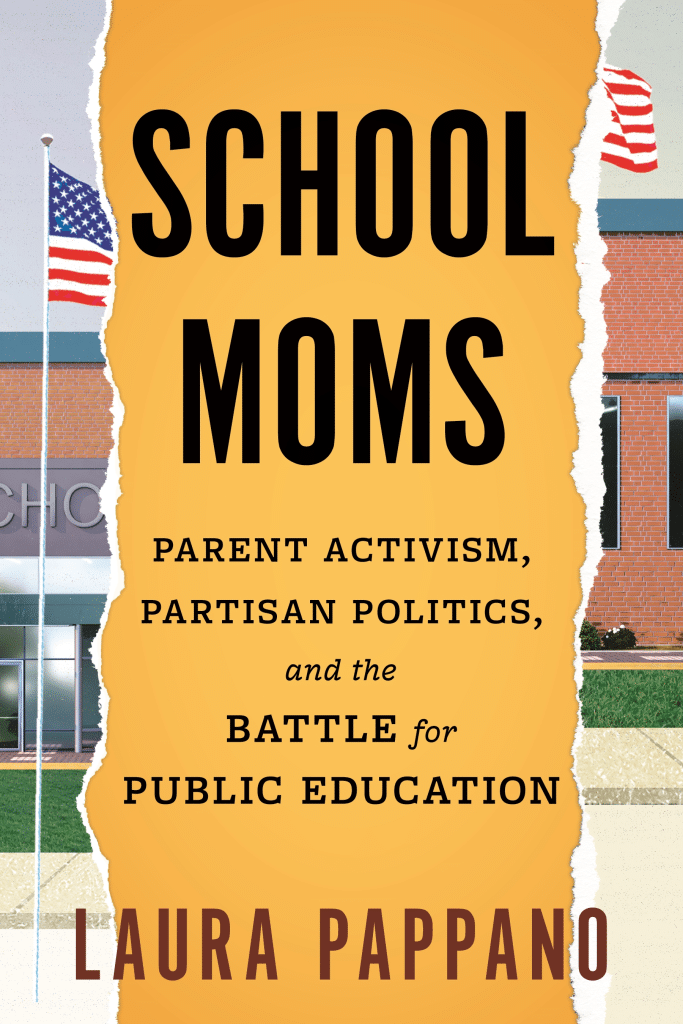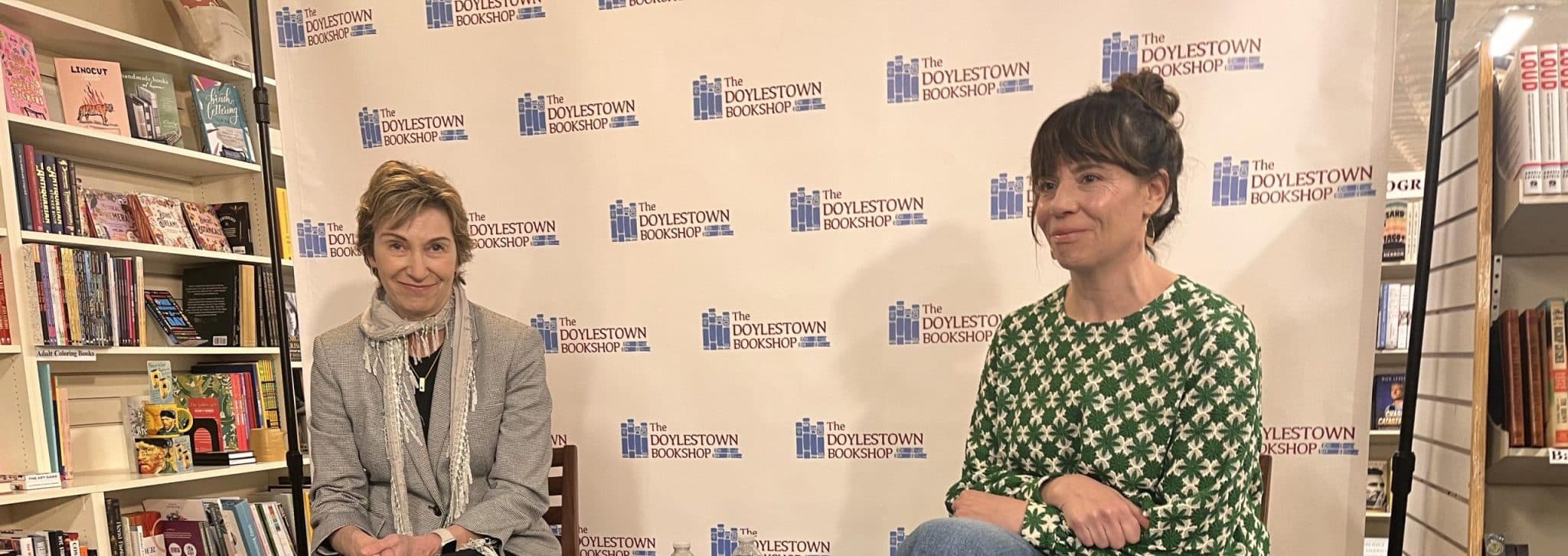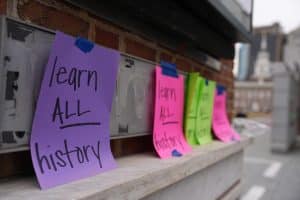Laura Pappano is an award-winning journalist and author who has written about K-12 and higher education for over 30 years for multiple publications including The New York Times, The Hechinger Report, Harvard Education Letter, The Washington Post, USA Today. She is the author or co-author of three books, The Connection Gap: Why Americans Feel So Alone, Playing with the Boys: Why Separate is Not Equal in Sports, and Inside School Turnarounds.
Pappano’s newest book, School Moms: Parent Activism, Partisan Politics, and the Battle for Public Schools offers a nuanced take on the cultural and political wars that have played out in school boards across the country, including here in Bucks County.
I had the opportunity to sit down with Pappano during her most recent visit to Doylestown.

What inspired you to write about public schools?
I didn’t plan to write this book, I didn’t even want to write the book. I felt compelled to write the book. I covered education for over 30 years as a journalist and what I started seeing was not about schools. It was not about education. I was hearing things that made absolutely no sense to me and I felt that I needed to clarify some things.
Can you talk a little bit about other times in history that public schools have been under attack?
There’s been a concerted effort to have that kind of authority over schools for a very long time, but it just never got too much traction. During the tail end of the Red Scare, teachers were losing their jobs, being accused of being communists. It was a time when people in that community thought that if your house was painted red, maybe it was a signal that you were a communist
LISTEN: The Right’s Long War on Public Education, with Jennifer Berkshire
In the book, I dug into archives and found out so much history. There was this teacher in Wayland, Massachusetts, who basically was run out of her job. She was a wonderful role model, a beloved teacher, who stood up and challenged, and said, “This is not right that everyone is being called in front of the school boards or the committees.” And she lost her job. Interestingly, the superintendent resigned when that vote happened, in kind of a parallel of what’s happening here in Bucks County. This teacher ended up cleaning animal cages at a veterinary hospital and then she even lost that job when somebody put her name on a list
Public schools have also been the subject of attacks from the religious right. You saw in the 1970s and 80s, this kind of realization by the religious right that rather than trying to put God into school, they would change their language very effectively to make it so that students have the right to pray, that parents have the right to have control over what is taught in the schools. It was this kind of flip.
We’re seeing similar things happen now, in different places in different ways. When this cabal gets rolling, it’s very hard to stop and people’s lives and livelihoods are at stake.
I was just emailing with a teacher in eastern Tennessee who is in my book, who is currently battling for his job. Matthew taught contemporary issues to 11th graders. He was essentially fired for teaching about white privilege and he’s battling to get his job back. It’s been two plus years of lawsuits.
So there is a history. But I would say that what we have now is a very deliberate and concerted effort by the far right to use school boards as a larger political platform.
For most of my reporting career, we had this kind of broad agreement that public schools were community spaces and communal spaces. I never knew going to public schools, what anyone’s politics were. As a PTO mom, I didn’t know what other parents’ policies were, because it did not matter. That was not the point.
What we have now is the Right using public schools as a political platform and a way to gain power. Steve Bannon said that school boards are the key that picks the lock. His point was that we’re going to take over district by district, town by town, by taking over school boards.
I saw this when I was at the first Moms for Liberty summit in Tampa, Florida in July 2022. Ron DeSantis announced that he was, for the very first time, going to endorse 30 moms for school board. These women kept standing up and being recognized and of course they were incredibly flattered. But what DeSantis was really doing was building a base for himself. That’s what we’re seeing over and over.
Patriot Mobile Action, a big super PAC in North Texas, donated $400,000 to and handpicked 11 school board Board candidates for districts. They want all those seats. And then when they get them you see consequences on the ground in those districts.
You here in Central Bucks completely understand that there’s a relationship between who is on your school board, and what life is like for students in school and for teachers in classrooms.
What role did the pandemic play in the attack on public schools?
What you saw during the pandemic was that it was hard for everyone. And that emotion, that frustration, was endemic, because the parents who were upset found each other. And very easily you could tell who was on what side.
So it became an accelerant as a way of expressing frustration. What I feel disappointed about is that, because the far right nationally has been funding and supporting and energizing that movement, we’re having the situation now where national political rhetoric is playing out on the ground, whether it applies or not.
I did some reporting in North Idaho and did a piece for the Hechinger Report and Vanity Fair that was out in December, in which, you know, most conservative Republicans were battling extremists for the survival of their school district. And when I was on the ground in November on election day, the issue that was being one of the key issues was, “transgenderism.” I’m not even sure what that is. But it was not actually the issue of concern in the school district.
The real issue of concern was that they didn’t pass the levy, and so they lost a third of their budget. They had no language arts curriculum for two years. They couldn’t clean the schools, there were mice running over children’s feet. And yet the national political rhetoric was what energized extremists to turn out at the polls. We’re seeing that sort of thing all over.
How were extremists able to organize on such a national level?
Well, the Heritage Foundation, the Leadership Institute, the Cato Institute, Betsy DeVos. The first three of these groups were founded in the late 1970s. They have very deep roots. They had so many on the ground ready to go and they have been working really hard at this for a long time.
But they have kind of ignored moms. Women are often the invisible doers in communities. And I think, strangely, it never occurred to them how powerful women could be in their movement. COVID, with the masks, and moms showing up places, was a revelation to them.
At the first Moms for Liberty Summit, one of the key sponsors was the Leadership Institute. I remember the representatives saying they had 600 people signed up already. The Leadership Institute then started their online training in August of that year, so a month later. I sat in on one of the Leadership Institute sessions, in which they said, “We will send anyone, anywhere on our dime to train school board candidates.”
What you realize is that they have all this money. My recollection is that between 2017 and 2021, their donations more than doubled to $39 million. So they have the money to do this, they have the resources.
Suddenly, these groups had a very active and involved constituency to spend the money on. They didn’t have to, like just write white papers and hope that somebody somewhere would listen. They had something far more powerful that they had overlooked, which were moms. And they did a really good job of mobilizing them.
How is emotional manipulation used as a strategy of the Far Right?
When I went to the Moms for Liberty summit, I was most surprised by the fact that it just made no sense. It was just about emotions. The message was, you may not be comfortable running for office, stepping up, speaking of school board meetings, being visible, being attacked yourself, but you’re doing it because your children are in danger. Your children are facing attacks. They’re being sexualized in schools, their libraries are full of pornography, teachers are trying to change the gender of your child … none of which is true.
But the fear that they stoke is very similar to the fears during the Red Scare. I mean, if you heard James Lindsay on that first day saying that sending your child to public school with 30 or 30 to 35 hours a week is like sending them to a master farm prison, it can really be like brainwashing.
The messaging was very scripted. There were even costumes.
It was a very emotional appeal. There wasn’t a lot of thinking or questioning.
I started to realize that nobody was saying, “Hey, can you explain why social emotional learning is a form of Marxism?” Nobody questioned that. It was a kind of word salad and I was baffled.
READ: Moms for Liberty and the Dominionist Assault on America’s ‘Education Mountain’
I realized how fast things were moving when one of the lawyers (who’s on the board of Moms for Liberty) was talking about the “Don’t say gay law” that had passed at that time. He said, “The law has passed but there’s a lot more we need to do. It’s like if you have an AK 47 and you need to add on a finder, and you need to add on a flashlight or laser.”
I was stunned, because this was a handful of weeks after the shooting at Uvalde.
And what I was even more stunned by was that there was not a peep in the room. These Moms say that they’re deeply concerned about the safety of their children, but they’re not listening, or judging, or applying any kind of scrutiny to the information they’re getting.
We’ve seen a kind of breakdown of Moms for Liberty across the country. Do you think that they’ve given up on this particular battle?
I don’t think they’ve given up on the battle. I think what they’ve done really effectively, though, is frame it in a way that other groups that may not be named Moms for Liberty may have picked up on.
Last Thursday, I was invited to speak with the House Democratic Caucus in DC and one of the things that they particularly wanted to talk about was parental rights.
To me, that was a signal that their language had been very effective. We all have parental rights, we exercise them. Librarians are perfectly happy to not have your child take out certain books and yet, this has become a kind of rallying point.
LISTEN: Unmasking Moms for Liberty’s Extremism, with Olivia Little and Diana Leygerman
The fact that Democratic members of Congress wanted some clarity around this made me realize that they had been very effective in their messaging.
What this movement is doing is taking away a really important developmental experience that kids have … which is that, inside schools, you can be whoever you want to be. You can be goth one year, you can be preppy the next year. You can try on different identities to figure out who you are. The idea that you’re policing this on such a granular level, and making it very difficult for kids to make public mistakes in school, among their peers is really problematic. They need that freedom.
Parents already have the right to oversee the raising of their children. The idea that you’re going to dig into every last little aspect of their experience is like going into a kid’s locked room. It’s like violating a kind of psychological privacy that I think kids deserve and need.

What is the next step for Districts like CBSD that have gotten far right extremists off our school board?
It seemed almost like there’s been a vengeful response from the Far Right.
I worry that things have devolved into opposing teams, rather than a shared goal of “how do we make these schools good for our kids.”
I guess one of the data points that is really important to me is that 90% of children in America attend public schools. In 1986, 70% of them were white, in 2020, 46%, were white, and by 2030, 43% will be white. The demographics of our schools are changing, on economic, cultural, social levels. I do not understand why inclusion (around which a lot of this tension is happening) is even a political issue. We need all of these kids to be educated and educated well and be members of our society and productive citizens. We cannot be sidelining the very people that are part of our broader culture in our country.
READ: New Jersey Residents More Worried by Book Bans Than Controversial School Lessons, Poll Says
There’s a parallel here to the segregation that happened after Brown versus Board of Education. The voucher movement is funneling money from public schools to private schools, and private Christian schools, in particular. I worry about the educational disparities in some of these states. In Florida, for example, only 4% of the voucher-accepting schools in the state were non-profit, non-religious, and accredited. Vouchers were used in some places as ways of offering low income families the potential ability to go to a better school, if they felt that was a better choice for them.
So like in Arizona, many of the large percentage of those people who were getting vouchers were already sending their kids to private school. In Arizona, the vouchers were $8,000. At that time, a year or so ago, the average private school in Arizona was $12,500. Many of these places are raising tuition, because the families who are already coming to these schools are now using vouchers.
Another issue is that in Florida, for example, families can get money that they can use to “homeschool”. And in certain states there’s no way of ensuring that kids are actually getting educated with this money. There are stories of people taking the money and using it for things like Disney admission or trampolines. What does this mean for the next generation? I do worry that we’re gonna have a swath of students who are completely uneducated, or educated with these far right Christian values.
What can we as parents do to help protect our public schools?
Showing up. What Kate and her AFIE organization is doing is just amazing.
I’ve mentioned them so many times in interviews and to Congress. They are doing things like clarifying ‘\“What does this policy mean? What are the legislative threats? What do we need to worry about? What happened with the school board meeting here?” I think it’s a tremendous service.
The cool thing that has come out of this is that there are moms around the country who are doing that. We’re saying, “Wait, hold on here. We care about public schools, we care about public education, they’re foundational to democracy. And we are going to make sure that the public is informed enough to vote.”
I know that here you’ve had very good voter turnout. But that’s not the case everywhere. There was a Board in Texas where one of the candidates who was a teacher and longtime school board member got voted out because of a right-wing crusade. They spent a lot of money and she lost by 51 votes in an election, with a 10% voter turnout.
In Idaho, one of these seats was lost to the far-right candidate by eight votes. The woman who ran against her was a strong candidate and I asked her how she’d lost and she said that everyone just assumed that she would win and didn’t show up.
We can’t assume. We have to show up. Democracy is not a spectator sport. We have to be there and be on the ground. Moms are really good at that. We’re really powerful. We learned that the last few years.
Something that Kate Nazemi does which is special is that she has events and she invites everybody. It’s such a wonderful way of bringing people together and reminding us that this is a community. When I told Kate that, she responded with something that I’ve repeated so many times. She said, “What everyone can agree on is that we all believe that we have the right to be who we say we are.”
That to me was such a powerful and well crafted thought.







